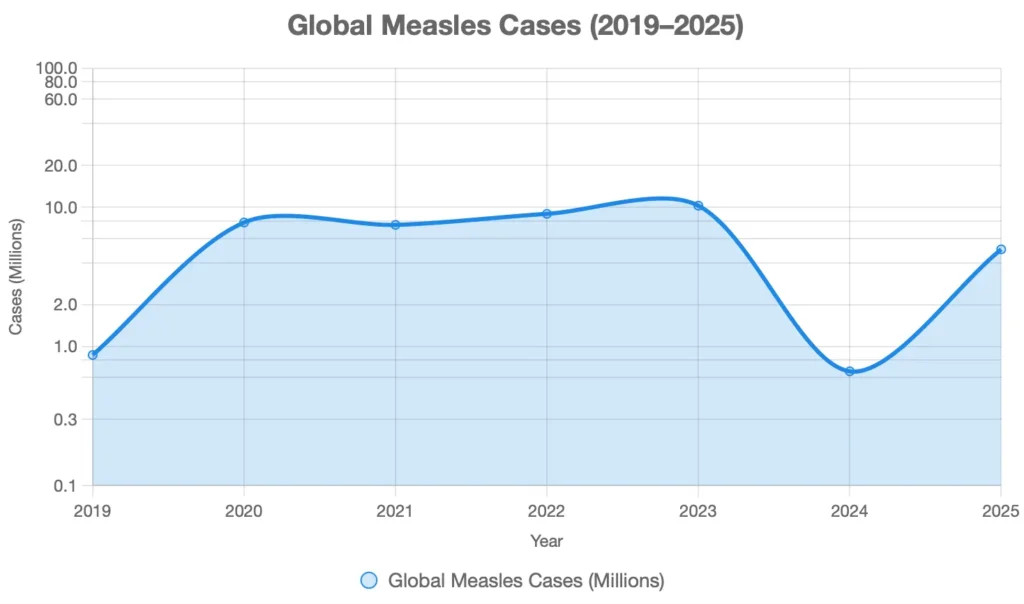The technologies described are investigational, not yet approved by regulatory agencies, and involve uncertainties. Forward-looking statements reflect current expectations and may differ materially from actual outcomes.
When Vaccines Aren’t Enough: Mapping Measles and Preparing for What’s Next
Measles was supposed to be behind us. Instead, it’s back and it’s spreading.
Jared Bauer, Ceo of Seek Labs | June 23, 2025
Consider a hypothetical but all-too-real scenario: In March 2025, Maria watched her son’s fever spike and rash worsen rapidly in their rural Texas town, miles from the nearest hospital. She assumed measles was a disease of the past. But measles had returned, infecting 378 Americans by March, more cases than reported from 2021 through 2023 combined (229 cases total). Just recently, in June 2025, Utah confirmed its first measles case amid this nationwide resurgence, underscoring the immediacy and widespread nature of this threat. This isn’t just a resurgence; it’s a global warning, reminding us of the vulnerability in relying solely on vaccines.
Globally, WHO reported 10.3 million cases in 2023 alone, a 20% increase from the previous year, overwhelming health systems from Africa to Eastern Europe. These outbreaks resulted in approximately 107,500 deaths in 2023 alone, underscoring the human toll of measles. In the first five months of 2025 alone, nearly 200,000 global cases have already been reported, signaling the urgency of this escalating threat. Vaccines remain foundational, but in a world where coverage gaps and hesitancy persist, they can’t be our only line of defense.

The Fragility of a Single-Tool Defense
Measles is genetically stable, and the vaccine remains remarkably effective. Yet, “stable” doesn’t mean unchanging. Viruses can evolve, but assumption can be even more dangerous than mutation. When we assume vaccines alone are invincible, we leave ourselves exposed, particularly when global vaccination rates falter, as reported by WHO.[5]
In our interconnected world, one region’s vulnerability becomes everyone’s risk.

Data Source: Centers for Disease Control and Prevention (CDC), Measles Cases and Outbreaks Data, 2025. Retrieved from cdc.gov/measles
BioSeeker: Building the Global Disease Atlas
BioSeeker is Seek Labs’ proprietary AI-driven platform designed to scan viral genomes and identify actionable vulnerabilities, not just for measles, but across numerous high-risk pathogens.
We’re building the Global Disease Atlas, a dynamic and proactive map actively targeting pathogens associated with approximately 95% of major global infectious disease burdens, such as influenza, dengue, and emerging threats. This provides a proactive blueprint for therapeutic intervention, pathogen by pathogen and vulnerability by vulnerability.
For measles, BioSeeker has identified genomic targets with strong computational validation, representing promising starting points for therapeutic exploration. These discoveries are foundational, computationally validated, and ready to accelerate therapeutic development when necessary.
This isn’t just mapping viruses; it’s creating global readiness infrastructure.
PTAP: From Mapping to Therapeutics
BioSeeker’s insights directly power our Programmable Therapeutic Assembly Platform (PTAP), designed to rapidly generate precise, CRISPR-based antiviral therapies at the molecular level.
Think of PTAP as a programmable smart missile for viruses, locked onto genetic vulnerabilities and striking with precision. These antiviral therapies precisely target identified genomic vulnerabilities, disabling viral replication without affecting human DNA. PTAP therapeutics offer significant potential advantages, especially in regions where vaccines face distribution or effectiveness challenges.
PTAP’s capabilities have been validated through promising veterinary outcomes against African Swine Fever Virus (ASFV). While human applications, including measles, are still in preclinical stages, the platform demonstrates clear potential for rapid and scalable responses to viral threats.
A Broader Vision of Preparedness
This initiative transcends measles. It’s about proactive global preparedness.
Climate change, increasing urban density, global migration, and geopolitical instability are accelerating the risk of viral outbreaks. The traditional approach of waiting to vaccinate is no longer sufficient. We require agile systems that respond quickly, adapt to emerging threats, and uphold global equity.
Mapping measles showcases what’s achievable: moving from reactive containment to proactive preparedness.
Scaling PTAP globally demands thoughtful consideration of cost, regulation, and infrastructure. Recognizing the paramount importance of safety and public trust, Seek Labs engages regulators and government agencies to define responsible pathways for swift and safe therapeutic deployment.
The recent confirmation of measles in Utah, home to Seek Labs and a vibrant life sciences community, highlights the reality that no region is immune and underscores the urgent need for proactive preparedness at every level.
What the World Needs Now
Seek Labs is dedicated to mapping viral threats because every virus understood brings us closer to true global readiness. Preparedness isn’t just a goal; it’s our responsibility. Together, we can build a world where no outbreak catches us off guard. The next outbreak won’t wait, and neither should our response.
REFERENCES
[1] CDC, Measles Cases Data, 2025. CDC.gov
[2] CDC Health Advisory, March 2025. CDC.gov HAN00522
[3] WHO, Measles Cases Surge Worldwide, November 2024. WHO.int
[4] UNICEF & WHO, Measles outbreaks, April 2022. WHO.int
[5] UNICEF & WHO Europe Report, 2025. UNICEF.org

